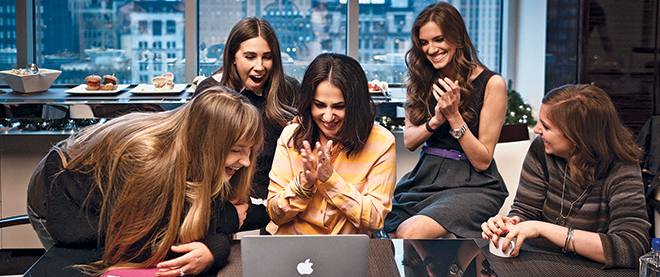Television co-showrunners guide new talent
But hiring experienced writers to guide new-show creators comes with risks
Chad Batka / The New York Times / Redux
Share

In television today, many shows need two separate but equal producers, one to create it, and another one to run it. New creators such as Lena Dunham (Girls) and Liz Meriwether (New Girl) have become famous, but they work with other, more experienced writer-producers assigned to the project by the studio. Jonathan Davis, executive vice-president of comedy development for 20th Century Fox Television, told Maclean’s recently that when a show is written by someone new, the choice of a co-showrunner is of special importance. “We have this great creator here who’s a little bit raw and doesn’t know the big world of network TV,” he explains. “We try to find somebody who will not only supervise and keep the trains running, but also help them reach their creative potential.”
These non-creating showrunners are often writers on overall deals with the studio, who get the job working on other people’s shows after their own projects don’t work out. On New Girl, Meriwether was teamed with Brett Baer and David Finkel, two writers who have been on the staff of everything from Pinky and the Brain to 30 Rock; Girls’ co-showrunner is Jenni Konner, creator of single-season sitcoms such as Help Me Help You. Unlike past hits such as The Sopranos or Seinfeld, which were largely under the complete control of their creators, some of today’s shows share power more evenly; the biggest hit drama in TV, The Walking Dead, has seen creator Robert Kirkman working with at least three different showrunners.
Many people in TV see this system as the ideal way to strike a balance between new viewpoints and experience. “I think it’s always good to have new fresh faces,” says Malin Akerman, who stars in the upcoming sitcom Trophy Wife, a show created by two inexperienced writers and executive-produced by The Office veterans Lee Eisenberg and Gene Stupnitsky. “But at the same time, you need your veterans who know what they’re doing.” Davis says that by teaming writers, studios have been able to take chances on creators who “maybe don’t know the day-in day-out of making a big network television show.”
An example he points to is Meriwether, a playwright and screenwriter who had no TV experience prior to creating New Girl: “The key in this whole thing is to protect the creator’s vision no matter what,” says Davis. “Liz Meriwether is that kind of bet.” Inspired in part by the success of Meriwether and Dunham, many of the new shows planned for the fall are by young creators under the guidance of old pros, like Super Fun Night, which teams creator-star Rebel Wilson (Bridesmaids) with 30 Rock producer John Riggi.
A downside of the teamwork strategy is that it can lead to power struggles. NBC’s drama Smash fell apart after a well-reviewed pilot, thanks partly to much-publicized disagreements between the creator, playwright Theresa Rebeck and her assigned co-producer. And there are fears that too much splitting of power can lead shows to be watered down. “When we bring on a supervisor,” Davis says, “the last thing we want to happen is when a creator feels muted or homogenized.” He adds that studios have to be careful to make sure these teams have chemistry. “We let them have a couple of weeks to know each other, get together. We try to maintain fluidity in those situations, and not jam people together. That never works out.”
Some shows still find that they work best when one person is in charge of everything. Laura Prepon, one of the stars of the new Netflix series Orange is the New Black, says the show’s consistent tone comes from creator Jenji Kohan (Weeds) overseeing every aspect of it: “We don’t have another executive producer-writer that I’m aware of,” she says. “Everything pretty much filters through Jenji.” Still, the team-up system is one that TV studios are likely to use even more often in the future—leaving actors hoping these newly created teams will work out. Akerman says the working relationship between her producers, despite their not being a team before the show started, “has been a complete collaboration. Any issues that come up, we all get together.” But, she adds, “it doesn’t always happen, I realize.”